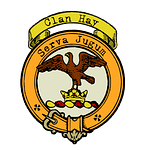Welcome back to "A Clan A Day Podcast," brought to you by bagtownclans.com. I'm your host, Colin MacDonald. Today, we’ll take aim at the history of Clan Fletcher, a fascinating Scottish clan with deep roots in the art of war, politics, and craftsmanship. Known as the "makers of arrows," the Fletchers embody resilience, ingenuity, and a keen sense of loyalty that has threaded through the centuries. Let’s explore their story.
The name Fletcher originates from the French word fléchier, meaning arrow maker. This connection to the craft of fletching—a vital skill in medieval warfare—rooted the clan's identity in service to powerful Highland families. The Gaelic translation, Mac-an-leister, meaning "son of the arrow maker," highlights the clan's early association with the trade. Historical records show that Fletchers settled across Scotland, often affiliating with clans like the MacGregors and Campbells, crafting the arrows that ensured their survival and victories.
One of the earliest documented Fletchers, Angus Mac-an-leister, born around 1450, led the clan in Glen Orchy, Argyll. There, they served under the MacGregors until political maneuvering by Duncan Campbell of Glenorchy in the reign of James VI forced the Fletchers to relinquish their ancestral lands. The Campbells used legal and military pressure to take control, reducing the Fletchers to tenant status in their homeland.
The Fletchers of Dunans trace their origins to Archallader Castle in Glen Orchy. After losing their seat there, the family relocated to Dunans in 1764, carrying with them the door of their former castle—a symbol of resilience. Dunans Castle became the heart of the clan's identity, later transformed into a Franco-Scots baronial marvel in the 19th century. Although a fire in 2001 left much of the structure in ruins, its striking design and storied history remain a beacon for the clan’s legacy.
Archibald Fletcher of Dunans (1746–1828) was a notable figure in this branch of the clan. Known as a lawyer and reformer, Archibald fought for abolition and supported American independence, showcasing the clan’s progressive ideals. His story adds a unique dimension to the Fletchers' legacy, blending loyalty to Scotland with broader humanitarian ideals.
In contrast, the Fletchers of Saltoun are tied to East Lothian, where they purchased Saltoun Hall in 1643. This branch of the clan rose to prominence with Andrew Fletcher of Saltoun, also known as "the Patriot." Born in 1653, Andrew was a fierce critic of the 1707 Act of Union between Scotland and England. His political philosophy and fiery rhetoric against unionism made him a celebrated—and controversial—figure in Scottish history. A staunch advocate for Scottish independence, Andrew embodied the intellectual and rebellious spirit of his clan.
Saltoun Hall remains a testament to this branch's influence, reflecting a blend of the clan's craftsmanship and their commitment to preserving Scottish identity.
Clan Fletcher’s history is marked by its participation in Scotland’s most defining conflicts. During the Jacobite Risings of 1715 and 1745, the Fletchers played a delicate balancing act. The ninth chief, Archibald Mac-an-leister, led the clan into battle for the Jacobite cause. However, his strategic decision to also provide troops to the Hanoverian forces ensured the clan avoided forfeiture and retained its standing during tumultuous times.
The Fletchers' skills were not limited to arrow making or warfare. They contributed to Scottish political and intellectual life through figures like Archibald Fletcher of Dunans and Andrew Fletcher of Saltoun, whose advocacy for reform and Scottish autonomy shaped the nation's course.
Dunans Castle is a cornerstone of the Fletcher legacy. Originally settled in 1590, it was transformed into a stunning baronial castle by the early 19th century. Its dramatic setting, complete with an "A-listed" bridge spanning a cascading ravine, adds to its breathtaking allure. Although largely in ruins today, efforts to preserve Dunans Castle continue, reflecting the enduring pride of Clan Fletcher.
Another significant site, Archallader House, lies in ruins but carries historical weight as the Fletchers' original Highland home. Saltoun Hall, the seat of the Saltoun branch, stands as a lasting monument to the clan’s political and social contributions.
Beyond the battlefield and political arena, the Fletchers left a mark on Scotland's cultural heritage. They were known patrons of the arts, and their contributions to institutions like Glasgow Cathedral, while financially draining, reflect their commitment to enriching Scottish society. Clan lore even speaks of a mold of an original Fletcher bow, discovered in the attic of Dunans Castle and dated to 1864—a fitting symbol of the clan’s enduring craftsmanship.
Today, Clan Fletcher is considered an armigerous clan, as it lacks a recognized chief. Despite this, the clan's identity thrives through the preservation of sites like Dunans Castle and the efforts of Fletcher descendants worldwide. The Clan Fletcher Society keeps the spirit alive, celebrating the clan's unique blend of martial, political, and cultural achievements.
Thank you for joining us on this journey through the history of Clan Fletcher. From their origins as master arrow makers to their role as reformers and warriors, the Fletchers have aimed high and left a lasting legacy. Be sure to tune in tomorrow for another episode of "A Clan A Day Podcast." As always, I’m your host, Colin MacDonald, and until next time, Alta Pete—aim at high things.











